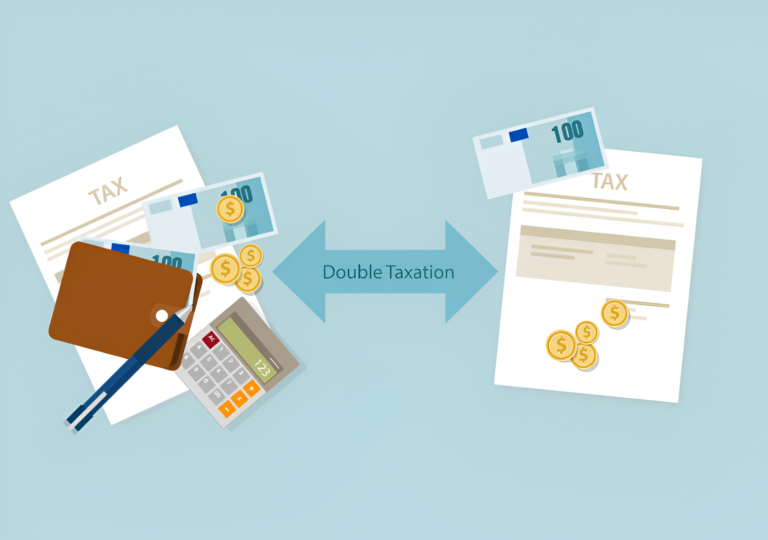Real Estate Investment Trusts (REITs)
A Real Estate Investment Trust (REIT) is a company that owns, operates, or finances income-producing real estate. REITs allow individual investors to pool resources and invest in large-scale properties like office buildings, apartments, and shopping centers. Investors receive income through dividends from the REIT’s earnings.
Importance of Understanding Tax Advantages
Understanding the tax benefits of REITs is crucial for investors, as these advantages can enhance overall returns. REITs provide tax efficiencies that make them an attractive investment option. Investors who understand these benefits can better optimize their investment returns.
1. Pass-Through Taxation: REITs Avoid Double Taxation
How Real Estate Investment Trust (REIT) Are Structured to Pass Income Directly to Shareholders
REITs operate under pass-through taxation, meaning they are not subject to corporate income taxes. Instead, REITs are required to distribute at least 90% of their taxable income to shareholders as dividends. This income is passed directly to investors, who then pay taxes on the dividends at their individual tax rates.

Contrast with Corporate Taxation (Double Taxation)
In a typical corporation, income is taxed twice: once at the corporate level and again when dividends are distributed to shareholders. This is known as double taxation. Corporations must pay corporate taxes on their earnings, and shareholders then pay individual taxes on the dividends they receive, which can significantly reduce the total return to investors.
Impact on the Investor’s Tax Burden
With REITs, the avoidance of corporate-level taxes helps reduce the overall tax burden. Since the REIT does not pay taxes on its income, more money is available for distribution to shareholders. Investors are only taxed on the dividends they receive (and any capital gains if shares are sold), which often results in a lower total tax burden compared to traditional corporate structures.
2. Tax-Exempt Income from Dividends
Real Estate Investment Trust (REIT) Must Distribute 90% of Taxable Income
REITs are required by law to distribute at least 90% of their taxable income to shareholders as dividends. This ensures that REITs avoid corporate taxes by passing the majority of their income directly to investors, while the REIT itself is not taxed on this distributed income.

Tax Treatment of REIT Dividends
Dividends from REITs are typically taxed at the individual shareholder’s ordinary income tax rate, which can be as high as 37% for high-income earners. These dividends are not eligible for the lower tax rates applied to qualified dividends from other sources, such as stocks in regular corporations.
Potential for Qualified Dividends to Be Taxed at Lower Rates
Although most REIT dividends are taxed at ordinary income rates, some REIT dividends may be treated as qualified dividends and taxed at more favorable rates. If the REIT qualifies under certain IRS rules, some of its distributions may be eligible for long-term capital gains tax rates (ranging from 0% to 20%), which are typically lower than ordinary income tax rates. However, this benefit is more limited for REITs compared to other types of investments.
3. Depreciation Deductions
Real Estate Depreciation and Its Impact on REIT Earnings
Depreciation is an accounting method used to allocate the cost of a real estate asset over its useful life. For Real Estate Investment Trusts (REITs), properties like buildings and other real estate assets are depreciated, even though the properties themselves may appreciate in value. This creates a non-cash expense, which reduces the REIT’s reported taxable income.

How Depreciation Reduces Taxable Income, Benefiting Investors
The depreciation deductions lower the REIT’s taxable income, allowing the trust to pay less in taxes. This results in higher dividends being distributed to investors, as REITs are required to pass most of their taxable income onto shareholders. Therefore, depreciation reduces the REIT’s overall tax burden, benefiting investors through potentially larger dividend payouts.
Depreciation as a Non-Cash Expense
Because depreciation is a non-cash expense (it doesn’t involve any actual cash outflow), it’s especially advantageous for REITs. The reduction in taxable income occurs without affecting the REIT’s cash flow. This allows REITs to maintain strong distributions to investors while still benefiting from the tax shield provided by depreciation.
4. Capital Gains Tax Benefits
Preferential Treatment of Long-Term Capital Gains for Individual Investors
Long-term capital gains, which apply to assets held for more than one year, are taxed at a preferential rate compared to ordinary income. These rates are typically lower, ranging from 0% to 20%, depending on the investor’s income level, making long-term capital gains more tax-efficient than regular income, which can be taxed as high as 37%.

Real Estate Investment Trusts (REITs) Role in Distributing Capital Gains from Property Sales
When a REIT sells a property, any profits from the sale are considered capital gains. REITs are required to distribute these gains to investors. The capital gains distributed by the REIT are typically taxed at the lower long-term capital gains rate, assuming the property was held for more than one year.
Potential for Reduced Tax Rates on Capital Gains
Unlike ordinary income, which is taxed at higher rates, the capital gains from REIT property sales are often subject to lower tax rates. This allows investors to benefit from a more favorable tax treatment on the profits derived from the sale of real estate assets owned by the REIT.
5. Tax Deferral on REIT-Related Gains in Certain Accounts
Tax-Advantaged Accounts like IRAs and 401(k)s
Tax-advantaged accounts, such as Individual Retirement Accounts (IRAs) and 401(k)s, allow investors to defer taxes on investment gains until retirement. Contributions to these accounts can be made with pre-tax income (in the case of traditional IRAs and 401(k)s), and taxes are deferred until funds are withdrawn.

Tax Deferral or Tax-Free Growth for REIT Investments
When REIT investments are held within these tax-advantaged accounts, any capital gains, dividends, or other income generated by the REIT are either tax-deferred (for traditional IRAs and 401(k)s) or tax-free (for Roth IRAs). This means investors don’t have to pay taxes on the income generated by the REIT until they withdraw the funds, allowing their investments to grow without immediate tax implications.
Benefits for Long-Term Investors Seeking to Maximize Tax Savings
For long-term investors, holding Real Estate Investment Trusts (REITs) in tax-advantaged accounts can significantly enhance returns. The ability to defer or eliminate taxes on dividends and capital gains means that more of the REIT’s income stays invested, compounding over time. This strategy is particularly beneficial for investors seeking to maximize their tax savings and grow their wealth for the future without being hindered by annual tax payments.
6. 1031 Exchange Opportunities
Explanation of the 1031 Exchange Program
A 1031 exchange is a provision under the U.S. Internal Revenue Code that allows investors to defer paying taxes on capital gains when selling a property, provided the proceeds are reinvested in a like-kind property of equal or greater value. This is commonly used by real estate investors to defer taxes while continuing to grow their portfolio.

How REITs Can Take Advantage of the 1031 Exchange
Real Estate Investment Trusts (REITs) can use 1031 exchanges to defer taxes on gains from the sale of properties by reinvesting the proceeds into new properties. If a REIT sells an income-producing property and uses the proceeds to acquire a similar property, it can avoid paying capital gains taxes at the time of sale. This defers the tax burden and allows the REIT to continue growing its portfolio of real estate assets.
Potential for Investors to Benefit from Tax Deferral
While individual investors typically cannot use a 1031 exchange directly with REIT shares, they can still benefit indirectly. If the REIT itself takes advantage of 1031 exchanges to defer taxes, the savings can be passed along to investors in the form of higher dividends or more efficient property management. Additionally, investors can explore their own 1031 exchange opportunities when selling other real estate assets, helping them defer taxes while reinvesting in new properties.
7. Opportunity Zone Tax Incentives (for REITs Investing in Qualified Opportunity Zones)
Overview of Opportunity Zones and Their Tax Benefits
Opportunity Zones are designated areas in the U.S. where investors can receive tax incentives to encourage investment in economically distressed communities. These areas are eligible for special tax benefits under the Tax Cuts and Jobs Act of 2017. The main tax advantages include deferring and potentially reducing capital gains taxes for investments made in these zones.

How REITs Investing in Opportunity Zones Can Offer Tax Incentives
When Real Estate Investment Trusts (REITs) invest in Qualified Opportunity Zones (QOZs), they can take advantage of tax incentives such as deferral of capital gains taxes. The tax on capital gains from the sale of properties or assets held within the Opportunity Zone can be deferred until the earlier of the date the investment is sold or December 31, 2026. Additionally, if the REIT holds its investment in the Opportunity Zone for at least 10 years, any gains from that investment may be exempt from capital gains taxes.
Long-Term Tax Advantages for Investors in These Areas
For investors in Real Estate Investment Trusts (REITs) that focus on Opportunity Zones, there are significant long-term tax benefits. By holding REIT shares in Opportunity Zone-focused investments, investors may benefit from tax deferral and, eventually, tax-free capital gains on investments held for more than 10 years. These incentives make Opportunity Zones an attractive option for long-term investors looking to maximize their tax savings while contributing to economic development in underserved areas.
Conclusion
Investing in Real Estate Investment Trusts (REITs) offers several compelling tax advantages that can significantly enhance an investor’s returns.
The tax impact on individual investors can vary based on their financial situation, including income level, the type of account used for investment, and their investment strategy. While Real Estate Investment Trusts (REITs) offer great tax advantages, it’s important for investors to assess how these benefits apply to their specific circumstances.
It is highly recommended that investors consult with a tax advisor to get personalized guidance on how Real Estate Investment Trust (REIT) investments fit within their overall financial plan. By doing so, investors can maximize the tax efficiency of their Real Estate Investment Trust (REIT) investments and make informed decisions to optimize returns.
FAQs
Q. What is a REIT?
- A Real Estate Investment Trust (REIT) is a company that owns, operates, or finances income-producing real estate. Investors buy shares in a REIT, which allows them to receive a portion of the income generated from the properties, typically in the form of dividends.
Q. How does depreciation benefit REIT investors?
- Depreciation allows Real Estate Investment Trusts (REITs) to reduce their taxable income by accounting for the wear and tear on their properties. Since depreciation is a non-cash expense, it reduces the REIT’s taxes, resulting in potentially larger dividends for investors.
Q. What are the risks of investing in REITs?
- Like all investments, Real Estate Investment Trusts (REITs) carry risks. These can include fluctuations in real estate market values, interest rate changes, property-specific risks, and management issues within the REIT. It’s important to research the specific REIT and consider your financial goals and risk tolerance before investing.


Pingback: 10 Ways to Invest in the U.S. Market - Paisewaise
Pingback: 10 Ways to Invest in the US Market - Paisewaise
Awesome post! Your writing is very engaging and your opinions are very relevant. Thanks for sharing such useful information with us. Keep it up!
I love how you present details in a concise and logical manner that is easy to follow.